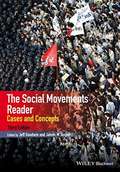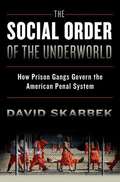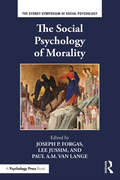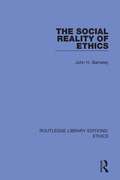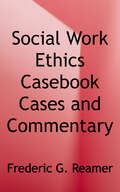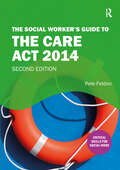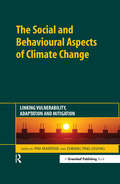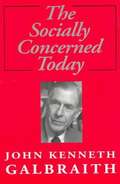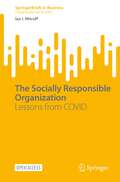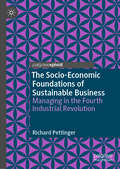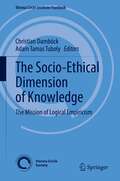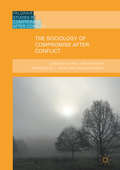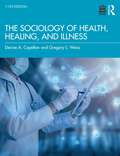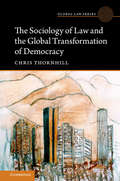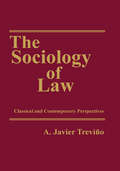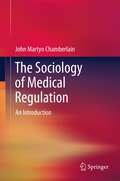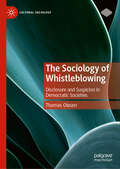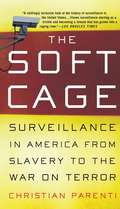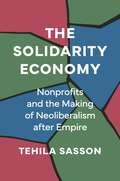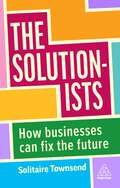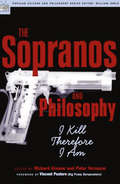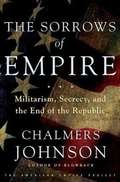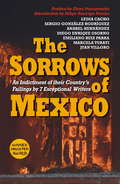- Table View
- List View
The Social Movements Reader: Cases and Concepts Third Edition
by Jeff Goodwin James M. JasperProviding a unique blend of cases, concepts, and essential readings The Social Movements Reader, Third Edition, delivers key classic and contemporary articles and book selections from around the world. Includes the latest research on contemporary movements in the US and abroad, including the Arab spring, Occupy, and the global justice movement. Provides original texts, many of them classics in the field, which have been edited for the non-technical reader. Combines the strengths of a reader and a textbook with selected readings and extensive editorial material.
The Social Order of the Underworld: How Prison Gangs Govern the American Penal System
by David SkarbekWhen most people think of prison gangs, they think of chaotic bands of violent, racist thugs. Few people think of gangs as sophisticated organizations (often with elaborate written constitutions) that regulate the prison black market, adjudicate conflicts, and strategically balance the competing demands of inmates, gang members, and correctional officers. Yet as David Skarbek argues, gangs form to create order among outlaws, producing alternative governance institutions to facilitate illegal activity. He uses economics to explore the secret world of the convict culture, inmate hierarchy, and prison gang politics, and to explain why prison gangs form, how formal institutions affect them, and why they have a powerful influence over crime even beyond prison walls. The ramifications of his findings extend far beyond the seemingly irrational and often tragic society of captives. They also illuminate how social and political order can emerge in conditions where the traditional institutions of governance do not exist.
The Social Psychology of Morality (Sydney Symposium of Social Psychology)
by Joseph P. Forgas Lee Jussim Paul A.M. Van LangeEver since Plato’s ‘Republic’ was written over two thousand years ago, one of the main concerns of social philosophy and later empirical social science was to understand the moral nature of human beings. The faculty to think and act in terms of overarching moral values is as much a defining hallmark of our species as is our intelligence, so homo moralis is no less an appropriate term to describe humans as homo sapiens. This volume makes a case for the pivotal role of social psychology as the core discipline for studying morality. The book is divided into four parts. First, the role of social psychological processes in moral values and judgments is discussed, followed by an analysis of the role of morality in interpersonal processes. The sometimes paradoxical, ironic effects of moral beliefs are described next, and in the final section the role of morality in collective and group behavior is considered. This book will be of interest to students and researchers in the social and behavioral sciences concerned with moral behavior, as well as professionals and practitioners in clinical, counseling, organizational, marketing and educational psychology where issues of ethics and morality are of importance.
The Social Reality of Ethics
by John H. BarnsleyOriginally published in 1972, this book clarifies ‘ethical’ concepts such as ‘values’, ‘norms’ and ‘precepts’. It begins with a discussion of the conceptual problems faced by any inquiry into moral codes. The author looks in particular at the numerous ways of specifying the ‘moral’ component in human affairs and at the need for a definition appropriate to the requirements of social research. He then examines these questions from amore empirical viewpoint, and emphasis is put on the interplay between concepts and methods in social research. The important issues of ethical relativism and its relation to sociological inquiry is also raised. In this way, some of the possible ethical implications of sociology itself, both as an empirical discipline and as an organizing perspective, are critically examined.
The Social Work Ethics Casebook: Cases and Commentary
by Frederic G. ReamerThis is the first ethics casebook, including extensive cases and commentary, published exclusively for social workers. The book's realistic ethics cases provide a useful tool for rich discussion of ethical dilemmas and ethical decision making. Following each set of cases, Reamer includes commentary highlighting key ethics concepts and references to relevant standards in the NASW Code of Ethics. <p><p>The release of Social Work Ethics Casebook highlights ethical issues related to confidentiality and privacy, informed consent, client self-determination, professional paternalism, boundary issues and dual relationships, conflicts of interest, cultural and ethnic diversity, termination of services, administration, collegial impairment, commitments to employers, social work education and training, and more. Each section of the book also includes discussion questions designed to enhance readers understanding and application of important ethics concepts.
The Social Worker's Guide to the Care Act 2014
by Pete FeldonThis best-selling book helps social workers gain a comprehensive understanding of how to achieve best practice in applying the Care Act 2014.The Care Act 2014 is a pivotal piece of legislation for adults with social care needs. It is particularly important for social workers, as it sets out the legislative context for the core social work processes that apply to all adults.The Social Worker’s Guide to the Care Act 2014 is a thoughtfully crafted resource that places social workers at the centre of the legal landscape. It takes a distinctive approach by honing in on what truly matters to social workers: assessing needs and formulating care and support plans that align with eligible requirements.Through a blend of key concepts, case examples, and critical evaluation, the book enhances legal literacy in a way that empowers social workers. It equips social workers with a clear understanding of the legal framework within which they operate, enabling them to make informed professional judgements and apply their expertise effectively.This eagerly awaited second edition reflects extensive revisions based on valuable insights derived from judicial reviews, Ombudsman decisions, and in-depth research. Drawing from the author's extensive experience in providing training on the Care Act, the revised edition introduces two new sections that delve into the realms of professional judgement and defensible decisions—essential areas of focus for social workers. Additionally, it incorporates the amendments made to the Care Act 2014 by the Health and Care Act 2022.This substantially revised second edition of The Social Worker's Guide to the Care Act 2014 will be your invaluable companion in navigating the complexities of social work and will be a source of knowledge, empowerment, and guidance.
The Social and Behavioural Aspects of Climate Change: Linking Vulnerability, Adaptation and Mitigation
by Pim Martens Chiung Ting ChangOver the past few years, and certainly since the publication of the "Stern Report", there has been increasing recognition that climate change is not only an environmental crisis, but one with important social and economic dimensions. There is now a growing need for multi-disciplinary research and for the science of climate change to be usefully translated for policy-makers.Until very recently, scientific and policy emphasis on climate change has focused almost exclusively on mitigation efforts: mechanisms and regulations to reduce greenhouse gas emissions. The success of such efforts to date is debatable. In fact, the impact of ever more stringent emission control programmes could potentially have enormous social consequences. Little effort has been expended on the exploration of a systematic evaluation of climate stabilization benefits or the costs of adapting to a changed climate, let alone attempting to integrate different approaches. There is an increasing recognition that the key actors in the climate crisis also need to be preparing for change that is unavoidable. This has resulted in a greater consideration of vulnerability and adaptation.The book, based on the research programme "Vulnerability, Adaptation and Mitigation" (VAM) which ran from 2004 to 2010, funded by the Netherlands Organisation for Scientific Research (NWO), presents a cluster of case studies of industries, communities and institutions which each show how vulnerability, adaptation and mitigation analyses can be integrated using social behavioural sciences. Each chapter makes specific recommendations for the studied industry sector, community or institution, analyses the latest research developments of the field and identifies priorities for future research. The book argues that the inherent complexity of climate change will ultimately require a much more integrated response both scientifically – to better understand multiple causes and impacts – as well as at the scientific/policy interface, where new forms of engagement between scientists, policy-makers and wider stakeholder groups can make a valuable contribution to more informed climate policy and practice.The book is particularly timely as the scientific research and policy debate is shifting from one of problem-framing to new agendas that are much more concerned with implementation, the improvement of assessment methodologies from a multi-disciplinary perspective, and the reframing of current scientific understanding towards mitigation, adaptation and vulnerability. A critical element in responding to the climate change challenge will be to ensure the translation of these new scientific insights into innovative policy and practice "on the ground". This book provides some fundamental elements to answer this need.The Social and Behavioural Aspects of Climate Change: Linking Vulnerability, Adaptation and Mitigation will be essential reading for social science researchers and policy managers in the area of climate change, as well as for those who want to know what the social and behavioural sciences can contribute toward coping with climate hazards. NGOs, law firms and businesses in the energy sector or other climate related fields will also find the book of great value.
The Socially Concerned Today
by John Kenneth GalbraithIn this Brief, Accessible Book, The Distinguished Teacher and former President of the American Economic Association, John Kenneth Galbraith, records his views on such critical subjects as what the goals of a socially concerned society should be today, reflections on the principles of distribution of wealth, flaws in the market system, the state of higher education, and related aspects of society and the economy.
The Socially Responsible Organization: Lessons from COVID (SpringerBriefs in Business)
by Ian I. MitroffThis book explores the nature of the socially responsible organization, specifically the role of crisis management in creating a socially responsible organization. It applies the Myers-Briggs Personality Typology (MBPTI) and the Thomas-Kilmann Conflict Framework to issues such as responses to the COVID-19 pandemic, regulation of tech companies, and infrastructure. Dr. Mitroff lists the major arguments given in regards to these issues and subjects them to the strongest possible scrutiny and critique to hold both individuals and organizations accountable to the larger responsibilities we share as global citizens. This is an open access book.
The Socio-Economic Foundations of Sustainable Business: Managing in the Fourth Industrial Revolution
by Richard PettingerThis book brings together key aspects of contemporary organisations with regard to the socio-economic foundations of sustainable business. We are now in the middle of the Fourth Industrial Revolution; an unprecedented development in technology and society, driven by social, political and economic demands. The Fourth Industrial Revolution is affecting business, but also has social consequences, as can be seen in the present and evolving patterns of economic activity. In turn, these consequences influence and create crucial and central issues regarding value, sustainability, security and assurance – aspects required and demanded by all areas of society.Based on work assessing the US and UK business sectors, including research conducted at the UCL in conjunction with such diverse organisations as the Bank of England, Google, Facebook and the Antwerp Diamond Exchange, this book addresses the key issues and challenges involved in integrating real and virtual environments. In addition, it uses case studies to illustrate the academic theory, blending industry and scholarly literature.Written by an expert in his field, this book delivers a realistic, practical and academically sound foundation for business, management and organisation studies, while also providing an interdisciplinary view on a transforming society, incorporating technology, IT, economics and sociology.
The Socio-Ethical Dimension of Knowledge: The Mission of Logical Empiricism (Vienna Circle Institute Yearbook #26)
by Christian Damböck Adam Tamas TubolyThis book studies how the relationship between philosophy, morality, politics, and science was conceived in the Vienna Circle and how this group of philosophers tried to position science as an antidote to totalitarianism and irrationalism. This leads to investigation of the still understudied views of the Vienna Circle on moral philosophy, meta-ethics, and the relationship between philosophy of science and politics. Including papers from an international group of scholars, The Socio-ethical Dimension of Knowledge: The Mission of Logical Empiricism addresses these topics and makes them available to scholars in the field of history of philosophy of science.
The Sociology of Compromise after Conflict (Palgrave Studies in Compromise after Conflict)
by John D. BrewerThis book introduces a new and original sociological conceptualization of compromise after conflict and is based on six-years of study amongst victims of conflict in Northern Ireland, South Africa and Sri Lanka, with case studies from Sierra Leone and Colombia. A sociological approach to compromise is contrasted with approaches in Moral and Political Philosophy and is evaluated for its theoretical utility and empirical robustness with in-depth interview data from victims of conflicts around the globe. The individual chapters are written to illustrate, evaluate and test the conceptualization using the victim data, and an afterword reflects on the new empirical agenda in victim research opened up by a sociological approach to compromise. This volume is part of a larger series of works from a programme advancing a sociological approach to peace processes with a view to seeing how orthodox approaches within International Relations and Political Science are illuminated by the application of the sociological imagination.
The Sociology of Health, Healing, and Illness
by Gregory L. Weiss Denise CopeltonWith thorough coverage of inequality in health care access and practice, this leading textbook is widely acclaimed by instructors as the most comprehensive of any available. Written in an engaging and accessible style, with multiple student-friendly features, it integrates recent research in medical sociology and public health to introduce students to a wide range of issues affecting health, healing, and health care today. This new edition links information on COVID-19 into each chapter, providing students with a solid understanding of the social history of medicine; social epidemiology; social stress; health and illness behavior; the profession of medicine; nurses and allied health workers; complementary and alternative medicine; the physician-patient relationship; medical ethics; and the financing and organization of medical care. Important changes and enhancements in the eleventh edition include: Inclusion of material on COVID-19 in the main text of every chapter, with special sections at the end of each chapter exploring additional intersections of COVID-19 with chapter content. Expanded coverage of fundamental cause theory and the social determinants of health. New centralized discussions of how and why social disparities in race, class, gender, and sexual identity impact health outcomes in the United States. New “In the Field” boxed inserts on topics such as medical education and student debt, physicians’ use of medical jargon, and corporate greed. New “In Comparative Focus” boxed inserts on topics such as the 1918 influenza pandemic, infant and maternal mortality in Afghanistan, the patient care coordination process, drug prices, long-term care, and global health. A more in-depth look at both physician and nursing shortages. Expanded discussion of nurse burnout during the COVID-19 pandemic. Curricular and pedagogical changes in medical schools. Discussion of continued changes in the financing of the US health care system. A more in-depth look at quality concerns in nursing homes. Increased attention to the health care systems in Norway, Germany, Cuba, and Mexico. An updated instructor’s guide with test bank and PowerPoint slides.
The Sociology of Health, Healing, and Illness
by Gregory Weiss Denise CopeltonWith thorough coverage of inequality in health care access and practice across the field it surveys, The Sociology of Health, Healing, and Illness is widely acclaimed by instructors as the most comprehensive of any available. Written in an engaging and accessible style, with multiple student-friendly features, it integrates and contextualizes recent research in medical sociology and public health to introduce students to a wide range of issues affecting health, healing, and health care today.This new edition links information on COVID-19 into each chapter, providing students with timely and familiar examples to deepen their understanding of the many social dimensions of health care, such as the social history of medicine, social epidemiology, social stress, health and illness behavior, the medical profession, nurses and allied health workers, complementary and alternative medicine, the physician-patient relationship, medical ethics, and the financing and organization of medical care.Important changes and enhancements to this eleventh edition include: A heightened focus on social disparities in race, class, gender, and sexual identity, addressing how these differences impact health outcomes in the United States and why Updates to the boxed sections that explore topics “In the Field” and “In Comparative Focus,” sparking readers’ curiosity and drawing their attention to topics such as medical education and student debt, as well as the continuities and differences in health care and public health issues across time and space Thorough examination of newer perspectives and developments in the field, including the issue of nurse and physician burnout during the COVID-19 pandemic, quality concerns in nursing homes, and the inner workings of health care systems in other parts of the world Improved support materials for instructors, featuring updated exam questions and lecture slides that correspond to the book’s newer content Altogether, the new edition of The Sociology of Health, Healing, and Illness maintains the foundational coverage of the field that the book is well known for and enriches its presentation with considered attention to contemporary patterns, perspectives, and research – perfect for introducing readers to the important and tremendously meaningful issues studied by medical sociologists.
The Sociology of Law and the Global Transformation of Democracy (Global Law Series)
by Chris ThornhillThis book provides a new legal-sociological account of contemporary democracy. It is based on a revision of standard positions in democratic theory, reflecting the impact of global legal norms on the institutions of national states. Chris Thornhill argues that the establishment of fully democratic, fully inclusive governance systems in national societies was generally impeded by inner-societal structural factors, and that inclusive patterns of democratic citizenship only evolved on the foundation of global legal norms that were consolidated after 1945. He claims that this process can be best understood through a transposition of key insights of classical legal sociology onto the form of global society. Extensive analysis of select case studies in different regions illustrate these claims. Thornhill offers a sociological theory of global law to explain contemporary processes of democratic integration and institutional formation, and contemporary constructions of citizenship and political rights. This title is also available as Open Access.
The Sociology of Law: Classical and Contemporary Perspectives
by A. Javier TrevinoThe purpose of this book is to introduce the sociology of law by providing a coherent organization to the general body of literature in that field. As such, the text gives a comprehensive overview of theoretical sociology of law. It deals with the broad expanse of the field and covers a vast amount of intellectual terrain. This volume is intended to fill a gap in the literature. Most textbooks in the sociology of law are insufficiently theoretical or else do not provide a paradigmatic analysis of sociological theories.The content of this text consists of discussions of the works of scholars who have contributed the most to the cumulative development of the sociology of law. It surveys the major traditions of legal sociology but is not wedded to any one particular theoretical approach. Both the "classical," or nineteenth-century, and "contemporary," or twentieth-century, perspectives are covered. The reader will see that nineteenth-century thought has directly influenced the emergence of twentieth-century theory.One unique feature of this book is that key sociological and legal concepts, presented in bold print and italics, are defined, described, and illustrated throughout. Although the nature of the subject matter is highly theoretical and, at times, quite complex, Trevino values every effort to present the material in the most straightforward and intelligible form possible without compromising the integrity of the theories themselves. In short, this book aims to accomplish three objectives: inform about the progressive advancement of sociological theory, teach the reader to analyze the law as a social phenomenon, and develop in the reader a critical mode of thinking about issues relevant to the relationship between law and society.
The Sociology of Medical Regulation
by John Martyn ChamberlainThis book provides a comprehensive examination of the complex issues surrounding the regulation of the medical profession. It offers up-to-date information on the current legislative framework and institutional arrangements surrounding the regulation in the United Kingdom. Well organized and written in an accessible way, it offers an insight into key sociological theories surrounding medical regulation. It gives a historically situated analysis of the contemporary relationship between medicine, the state and the public, and an overview of relevant social scientific research. Case studies highlight the practical or applied circumstances in which issues can occur. Readers will gain insight into possible future directions for medical governance.
The Sociology of Whistleblowing: Disclosure and Suspicion in Democratic Societies (Cultural Sociology)
by Thomas OlesenThis book views the whistleblower as a key character in democratic societies. It argues that whistleblowing is likely to become an increasingly important form of action in the coming years. Whistleblowers are unique actors in our democracies because they disclose wrongdoing from the inside, as organization employees. With their privileged access and specialized knowledge, they contribute powerfully to public, democratic, and moral debates in a way that no one else can. The book explores whistleblowers&’ relation to democracy by connecting them to values such as suspicion, openness, honesty, and critique. While anchored in a cultural sociological tradition, the book draws on several different sociological thinkers such as Niklas Luhmann, Ulrich Beck, Anthony Giddens, Jürgen Habermas, and Pierre Bourdieu. Themes in the book include the democratic history of the whistleblower, normalized wrongdoing in organizations, the place of whistleblowers in popular culture, and Big Tech whistleblowing. This book will be of interest to readers in fields including political sociology, public sociology, the sociology of work, and organization studies.
The Soft Cage: Surveillance in America From Slavery to the War on Terror
by Christian ParentiOn a typical day, you might make a call on a cell phone, withdraw money at an ATM, visit the mall, and make a purchase with a credit card. Each of these routine transactions leaves a digital trail for government agencies and businesses to access. As cutting-edge historian and journalist Christian Parenti points out, these everyday intrusions on privacy, while harmless in themselves, are part of a relentless (and clandestine) expansion of routine surveillance in American life over the last two centuries-from controlling slaves in the old South to implementing early criminal justice and tracking immigrants. Parenti explores the role computers are playing in creating a whole new world of seemingly benign technologies-such as credit cards, website "cookies," and electronic toll collection-that have expanded this trend in the twenty-first century. The Soft Cage offers a compelling, vitally important history lesson for every American concerned about the expansion of surveillance into our public and private lives.
The Solidarity Economy: Nonprofits and the Making of Neoliberalism after Empire
by Tehila SassonThe untold story of the role of humanitarian NGOs in building the neoliberal order after empireAfter India gained independence in 1947, Britain reinvented its role in the global economy through nongovernmental aid organizations. Utilizing existing imperial networks and colonial bureaucracy, the nonprofit sector sought an ethical capitalism, one that would equalize relationships between British consumers and Third World producers as the age of empire was ending. The Solidarity Economy examines the role of nonstate actors in the major transformations of the world economy in the postwar era, showing how British NGOs charted a path to neoliberalism in their pursuit of ethical markets.Between the 1950s and 1990s, nonprofits sought to establish an alternative to Keynesianism through their welfare and development programs. Encouraging the fair trade of commodities and goods through microfinance, consumer boycotts, and corporate social responsibility, these programs emphasized decentralization, privatization, and entrepreneurship. Tehila Sasson tells the stories of the activists, economists, politicians, and businessmen who reimagined the marketplace as a workshop for global reform. She reveals how their ideas, though commonly associated with conservative neoliberal policies, were part of a nonprofit-driven endeavor by the liberal left to envision markets as autonomous and humanizing spaces, facilitating ethical relationships beyond the impersonal realm of the state.Drawing on dozens of newly available repositories from nongovernmental, international, national, and business archives, The Solidarity Economy reconstructs the political economy of these markets—from handicrafts and sugar to tea and coffee—shedding critical light on the postimperial origins of neoliberalism.
The Solutionists: How Businesses Can Fix the Future
by Solitaire TownsendIn the face of our climate emergency, we desperately need solutionists working to fix the future. This is your handbook for becoming the leader that the world needs.The Solutionists sets out what it takes to join the new generation of entrepreneurs, CEOs and leaders transforming business to create a more sustainable society. Using a change blueprint, this book coaches you through the steps, mindsets and strategies that will put your organization at the forefront and take personal ownership of sustainability solutions.With an inspiring selection of stories from leading entrepreneurs and organizations, this book illustrates how sustainability solutionists are paving the way to solving the biggest crisis our planet has ever faced whilst driving business innovation and growth. Including plant-based food sources, net-zero technologies and circular platforms, these stories demonstrate how sustainable disruption can transform your business, regardless of size or industry.Solitaire Townsend has been inspiring the world's top brands for over two decades and, along with some of the world's leading solutionists, she invites you to join the answer activists and grow your business while co-creating a better world.
The Sopranos and Philosophy: I Kill Therefore I Am
by Peter Vernezze Richard Greene Vincent PastoreThis collection of essays by philosophers who are also fans does a deep probe of the Sopranos, analyzing the adventures and personalities of Tony, Carmella, Livia, and the rest of television's most irresistible mafia family for their metaphysical, epistemological, value theory, eastern philosophical, and contemporary postmodern possibilities. <P><P>No prior philosophical qualificationsor mob connections are required to enjoy these musings, which are presented with the same vibrancy and wit that have made the show such a hit.
The Sorrows of Empire: Militarism, Secrecy and the End of the Republic
by Chalmers Johnson[From the book jacket] In the years after the Soviet Union imploded, the United States was described first as the globe's "lone superpower," then as a "reluctant sheriff," next as the "indispensable nation," and, in the wake of 9/11, as a "New Rome." Here, Chalmers Johnson thoroughly explores the new militarism that is transforming America and compelling its people to pick up the burden of empire. Reminding us of the classic warnings against militarism-from George Washington's Farewell Address to Dwight Eisenhower's denunciation of the military-industrial complex-Johnson uncovers its roots deep in our past. Turning to the present, he maps America's expanding empire of military bases and the vast web of services that support them. He offers a vivid look at the new caste of professional militarists who have infiltrated multiple branches of government, who classify as "secret" everything they do, and for whom the manipulation of the military budget is of vital interest. Among Johnson's provocative conclusions is that American militarism is already putting an end to the age of globalization, and bankrupting the United States even as it creates the conditions for a new century of virulent blowback. The Sorrows of Empire suggests that the former American republic has already crossed its Rubicon-with the Pentagon in the lead.
The Sorrows of Mexico
by Elena Poniatowska Diego Enrique Osorno Lydia Cacho Anabel Hernández Juan Villoro Emiliano Ruiz Parra Marcela Turati Sergio González RodríguezWith contributions from seven of Mexico's finest journalists, this is reportage at its bravest and most necessary - it has the power to change the world's view of their country, and by the force of its truth, to start to heal the country's many sorrows.Supported the Arts Council Grant's for the Arts Programme and by PEN PromotesVeering between carnival and apocalypse, Mexico has in the last ten years become the epicentre of the international drug trade. The so-called "war on drugs" has been a brutal and chaotic failure (more than 160,000 lives have been lost). The drug cartels and the forces of law and order are often in collusion, corruption is everywhere. Life is cheap and inconvenient people - the poor, the unlucky, the honest or the inquisitive - can be "disappeared" leaving not a trace behind (in September 2015, more than 26,798 were officially registered as "not located"). Yet people in all walks of life have refused to give up. Diego Enrique Osorno and Juan Villoro tell stories of teenage prostitution and Mexico's street children. Anabel Hernández and Emiliano Ruiz Parra give chilling accounts of the "disappearance" of forty-three students and the murder of a self-educated land lawyer. Sergio González Rodríguez and Marcela Turati dissect the impact of the violence on the victims and those left behind, while Lydia Cacho contributes a journal of what it is like to live every day of your life under threat of death. Reading these accounts we begin to understand the true nature of the meltdown of democracy, obscured by lurid headlines, and the sheer physical and intellectual courage needed to oppose it.
The Sorrows of Mexico
by Elena Poniatowska Diego Enrique Osorno Lydia Cacho Anabel Hernández Juan Villoro Emiliano Ruiz Parra Marcela Turati Sergio González RodríguezWith contributions from seven of Mexico's finest journalists, this is reportage at its bravest and most necessary - it has the power to change the world's view of their country, and by the force of its truth, to start to heal the country's many sorrows.Supported the Arts Council Grant's for the Arts Programme and by PEN PromotesVeering between carnival and apocalypse, Mexico has in the last ten years become the epicentre of the international drug trade. The so-called "war on drugs" has been a brutal and chaotic failure (more than 160,000 lives have been lost). The drug cartels and the forces of law and order are often in collusion, corruption is everywhere. Life is cheap and inconvenient people - the poor, the unlucky, the honest or the inquisitive - can be "disappeared" leaving not a trace behind (in September 2015, more than 26,798 were officially registered as "not located"). Yet people in all walks of life have refused to give up. Diego Enrique Osorno and Juan Villoro tell stories of teenage prostitution and Mexico's street children. Anabel Hernández and Emiliano Ruiz Parra give chilling accounts of the "disappearance" of forty-three students and the murder of a self-educated land lawyer. Sergio González Rodríguez and Marcela Turati dissect the impact of the violence on the victims and those left behind, while Lydia Cacho contributes a journal of what it is like to live every day of your life under threat of death. Reading these accounts we begin to understand the true nature of the meltdown of democracy, obscured by lurid headlines, and the sheer physical and intellectual courage needed to oppose it.
